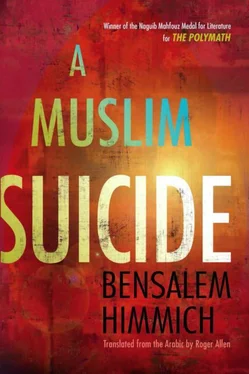It was amazing to see how her own language now proceeded to flow in joyous, sweet sequence. Either my cure had worked, or else her previous stammerings had been a facade. Whatever the case, the suggestion she had made lifted me up to yet higher planes of delight, and I was certainly going to accept it with the very greatest of pleasure and joy. Even though she had not been the one to take the initiative by talking about it, she had certainly now made her intentions very plain.
"My dear lady," I told her, "I'm honored by your suggestion." But then, by way of clarification, I went on, "I feel exalted, but…"
"But what, my dear Abduh?"
I had never been called by that abbreviation before. From now on, it would certainly be appended to my other names; in fact, because it came from the mouth of the one who had managed to capture my heart and love, it would now occupy primary position.
"My beloved," I replied, "I am a man for whom knowledge and learning are cherished entities. My life has been fated to be one of seclusion and devotion to scholarship."
Biting her fingertips in sheer bashfulness and longing, she blushed becomingly. "For you, my dear," she said, "I will be able to provide what is far more restful and sweet than mere seclusion. If you wish, I will have a special cloister built for you inside my house where no one will bother you and I will never venture. What I desire with all my heart is simply to be close to you."
Oh my, what wonderful, sweet, and unforgettable words those were! Oh my, how they penetrated my inner being and lodged happily inside my soul! I decided to check just one thing before finally acceding to her wishes:
"Did you say, my lady, that you would build me a cloister?"
"If you wish, I'll even build a tower where you can seclude yourself."
"But, my sweet lady, Sabta will not be my final resort. I may well be forced to leave here, just as I did my hometown of Murcia."
"Dear 'Abduh, devout shaykh who loves all pious folk, no harm can come to you here. My late father was a much respected man whose deeds will never be forgotten, and my late husband was director and supervisor of his council."
I accepted this response of hers with a smile and asked for no further details regarding the specific aspects of the marriage contract. I did not wish to reconsider my feelings and complicate matters, nor did I wish to look as though I were haggling over things. I decided to exploit the joy of the moment and savor its exalted purpose. Even so, the highly astute lady in question seemed to anticipate some of my concerns.
"My dear `Abduh," she went on, "if you wished to make the acquaintance of the governor of Sabta at your convenience, it can certainly be arranged. As far as our own union is concerned, that can be arranged in short order if you so desire. No relatives on my side are going to make any fuss about things, since there's nothing standing in the way of either yourself or a widow like me."
All of a sudden the sounds of the lute once again wafted into our little hideaway, almost inevitably rekindling the passions I felt for the lovely woman who had put her head with its silky hair on my chest. Without looking up, she started to say something softly, but it only came out as a stammer: "Dear `Abduh, would youk… k… k…"
I took this as an indication that she wanted more of my cure-method, so I turned her face toward me and started covering her with kisses even more passionate than the first time. I took the advantage in all it offered, but she responded in kind, albeit with a bit more modesty. Once again it managed to loose her tongue from its chains.
"Do you love me, `Abduh?" she asked.
My response came not with words, but in very explicit actions that found their inspiration in my very soul and body. I hugged and kissed her over and over again. Once more I was afraid that our mutual passion would lead us down a slippery slope into illicit territory. She may have detected my malaise, because at this point she slipped gently out of my arms. No sooner did the lute-playing stop than we heard the muted sound of gazelles heralding the arrival of Umm Haniyya, who was waiting in the reception hall.
I leapt up. "Make the necessary arrangements for our wedding," I whispered in my beloved's ear. "Choose whomever you like to help you and also the messenger who will ply between us. God alone will bring success, and in Him do we put our trust."
She signaled her agreement by kissing me softly. As she withdrew happily, the lute player, who now appeared from nowhere, accompanied me via a back door to a corridor that led to a capacious stable.
"My mistress gives you this fine horse," he said, the expression in his eyes conveying a host of meanings, "with her very best wishes and fond farewells. You luckiest of men, please be so good as to mount the horse that you have blessed by allowing it to bring you here."
I asked the boy to convey my deepest thanks and appreciation to his mistress, mounted the horse, and rode away.
This blessed horse made no attempt to hide how happy it was to have me as its rider; it was neighing and snorting with pleasure, almost as though his owner had instructed it to treat me well. It conveyed me across the city of its own accord and at a modest pace, but, once we reached the part of the city by the mountain, it started cantering in order to show me how powerful and well endowed it really was. As I turned my face toward the gentle breezes, how often did I embellish the space with luscious kisses and affection! I felt as if my mount were transporting me on wings, as though I myself were flying as I recalled the passionate moments I had spent with my beloved. No words had ever tried to describe the feeling before, and indeed none of the famous love-poets of the Arabic tradition would be able to do so even if they were to combine their efforts. The elemental footfalls and profound spiritual heartbeats that accompanied such joyous emotions of love were beyond the scope of mere words. Muhammad al-Niffari,* Abu Hayyan al-Tawhidi, and other major intellectual figures had all spoken about the impossibility of using words to encompass larger concepts. Were my friend the Meknesi shaykh to have experienced moments such as these, he would willingly have surrendered his soul out of sheer emotion…
I reached my own quarters in record time and sought out 'Abd al-Barr. I asked him to find someone to take care of my horse, and he assured me that he would do so. He then informed me sadly that Shaykh `Abd al-Kamil from Meknes had actually died that very afternoon. On his deathbed he had been continually invoking the names of God, his Prophet, and my own name as well. From time to time he would say peculiar things, like "Here's a chicken with cumin, Ibn Dara; God has given it to you… and here's the really good deal…" I had to suppress the urge to laugh, and promised the warden that I would meet him at the funeral the next day. With that I headed for the dead man's room, recited some verses over him, and then bade him a final farewell.
Before noon prayer the next day (which was a Saturday), I conducted a funeral rite for the dead man, and then he was buried amid a flood of prayers, including the ones that were dearest to him while he was still alive-namely that God would accord him a place in His paradise and pour on him the abundance of His blessings without interruption or recompense….
Immediately after the noon prayer in the mosque, 'Abd al-Barr invited me to have lunch with him in his house, and I duly accepted. Part of our conversation revolved around death and the next world, while other parts concerned people's lives and the troubles they faced in this world. I got the impression that my host had something he wanted to tell me but was hesitating. With a broad smile on my face I asked him directly what was troubling him. He frowned, gave a deep sigh, then explained to me how bad the situation was with the facilities at the zawiya, especially the quarters for travelers; worst of all were the conditions in the lunatic asylum. In the latter facility there were only five orderlies and assistants left, who persevered patiently in spite of the paltry salaries they received for their pains. The thing he feared most was that the overlord of the lunatics would die, and then the place would fall apart and descend into complete chaos. The number of regular donors was going down, he told me. But for the financial help he had received from the governor, Ibn Khalas, whom he praised profusely, the entire zawiya and its facilities would long since have been swept away like so much dust.
Читать дальше












